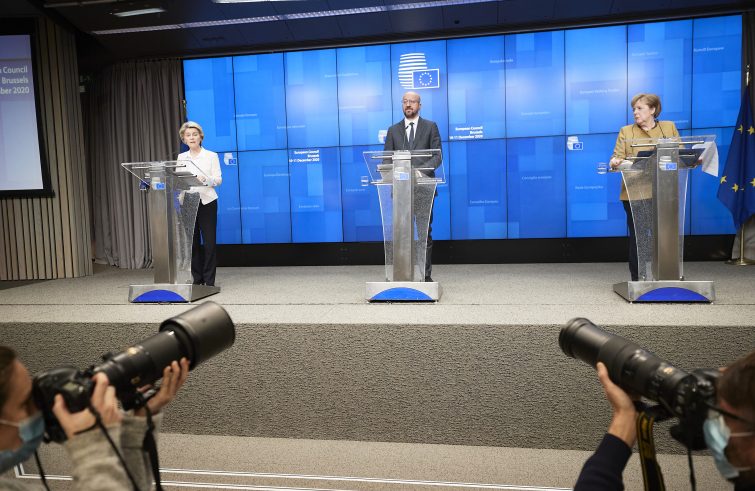
The COVID-19 pandemic would seem to have driven the EU and its member countries to seek common responses. Suffice it to mention the suspension of the Stability and Growth Pact rules, the various initiatives taken by the EIB and the ECB, and subsequently the SURE instrument, ESM, the redirection of structural funds… The agreement on the Multiannual Financial Framework and the Next Generation EU followed suit. Interview with Piero Graglia, Professor of History of European Integration at the University of Milan, expert in EU policies and author of several essays on the subject.
 Professor, what do you think of this “new” political process? Could it be a step forward towards community integration?
Professor, what do you think of this “new” political process? Could it be a step forward towards community integration?
Nothing will be the same as before. After initial difficulties, the fact that the EU had to respond in unison to a challenge of such proportions enabled it to fine-tune its strategies and tools for dealing with the crisis. I think the European response proved effective in terms of scope, breadth and incisiveness. Rather, it evidenced the slowdown caused by the Member States’ governments, finding it hard to comply with the need for extensive cooperation whilst demanding EU action where clear and defined responsibilities do not exist at European level. As often happens in the European integration process, the unfolding events have guided and shaped the evolving relationship between the EU and its member States. Post-crisis EU will be far more capable of intervening and overcoming Member States’ innate tendency to act on their own.
The great novelty of the issuance of euro-area sovereign debt and the new own resources that will be used to finance new policies are assets that will not disappear with the return to “normality.”
 Italy is in the process of finalizing the projects to be financed by Next Generation EU. It is a process fraught with obstacles, which includes the instability of its governing political majority. Do you think that the promised allocation of funds from the Recovery Plan is geared towards ecological and digital transformation? And most importantly, will it deliver in terms of overcoming the current economic and social crisis?
Italy is in the process of finalizing the projects to be financed by Next Generation EU. It is a process fraught with obstacles, which includes the instability of its governing political majority. Do you think that the promised allocation of funds from the Recovery Plan is geared towards ecological and digital transformation? And most importantly, will it deliver in terms of overcoming the current economic and social crisis?
Along with many other colleagues and journalists, I read the government’s first draft of the plan. The EU has mobilized an impressive amount of resources to help countries hit by the current health crisis. However, being a major recipient of EU aid is not in itself a good thing: it means that Italy’s problems are much more serious compared to those of other countries. It is essential for our country to use this money – consisting of grants to be spent on the basis of projects yet to be defined, and of loans equally deployable according to projects. However, the government’s plan is not a detailed project. In fact it sets out principles and commitments, but it’s all too vague. This may be due to the fact that Italy has never really developed an economic and social planning culture.
This plan involves a medium-term perspective which is distant from a political class marked by a hand-to-mouth approach, responding to problems as they arise rather than dealing with them within an extensive and complex scenario.
Indeed, we are all in the same boat: partisan criticism of the government’s plan is wasted in unnecessary polemics lacking, yet again, a clear agenda. You also asked me about the ecological and digital transition …
Indeed…
I admit that it is mentioned repeatedly, but I wonder whether it is due to the clear indications given by both the European Commission and the current Council presidency (Germany, in the second half of 2020 – Ed.’s note) or whether there is a clear awareness of its implications for our economic and social fabric. That particular transition and transformation will affect all economic sectors, without distinction; it will require specific measures and projects of which, at the moment, I see no trace.
 While Europe was called to respond to the coronavirus epidemic, Brussels was negotiating on Brexit. The UK is now a ” non-EU country”: what are the pros and cons?
While Europe was called to respond to the coronavirus epidemic, Brussels was negotiating on Brexit. The UK is now a ” non-EU country”: what are the pros and cons?
Great Britain experienced its membership of the European Economic Community as instrumental; Italy is often criticized for having regarded the European integration process as an “external constraint”, a means to modernize the country. I believe that this applies equally to the United Kingdom, which entered the process of European integration in the 1960s in dire economic and commercial straits.
The UK’s decision to leave the European Union, after having enjoyed the benefits of the common – and later single – market, has somewhat resolved a historical ambiguity:
it is bound to face many problems because it ceases to be part of the world’s first global economic organization, and at the same time it will have to deal with its ambitions as a major mid-sized power living in the dream of a no longer existing imperial legacy. No one knows how it will all play out. Based on historical experience, what was possible for Switzerland, Andorra and Liechtenstein is not possible for a country with a population of 60 million citizens, which lacks the strength to be a global player but which cannot limit itself to being a tax haven. In my opinion it hardly changes anything in terms of trade relations for the European Union: those with greater potential to replace imports and exports are always the strongest players. The EU has this potential thanks to the quantity and quality of its Members. The United Kingdom does not.
Were there a specific area of international political pedagogy, I would say that the European Union, safeguarding its legitimate interests – which are as legitimate as those of the United Kingdom – should help the United Kingdom come to terms with its mistake, a genuine mistake. Should the British wish to rejoin the EU cap in hand, as they did in 1961 – after a 12-year wait – I would expect them to eat a humble pie and confront its delusional imperial fantasies of the bygone past.
Angela Merkel will leave the political stage this year. What political legacy does she leave behind?
We will miss her, I suppose. Angela Merkel is a first-generation German politician who did not enjoy the heroic memory of the initial integration process. She is also the first German chancellor who did not experience a “native” Europeanism, having grown up in the German Democratic Republic. Nevertheless, she immediately embraced the traditional paradigm of German foreign policy: Europe and European integration are the drivers legitimizing post-war Germany as an equal player alongside other European States.
Her Europeanism is not opportunistic, as has often been the case with Italy. Indeed, hers is a Europeanism with Federalist connotations, interiorized through a painful and highly formative historical experience.
I see her legacy as that of a mature country now impervious to nationalistic revival, which in Italy, by contrast, is resonating strongly. I think that whoever succeeds her will uphold these core values. Ultimately, in my opinion, Germany’s determined adherence to European integration, not only in terms of trade but also in political and social terms, is the best guarantee for the continuation of this extraordinary process of integration.











